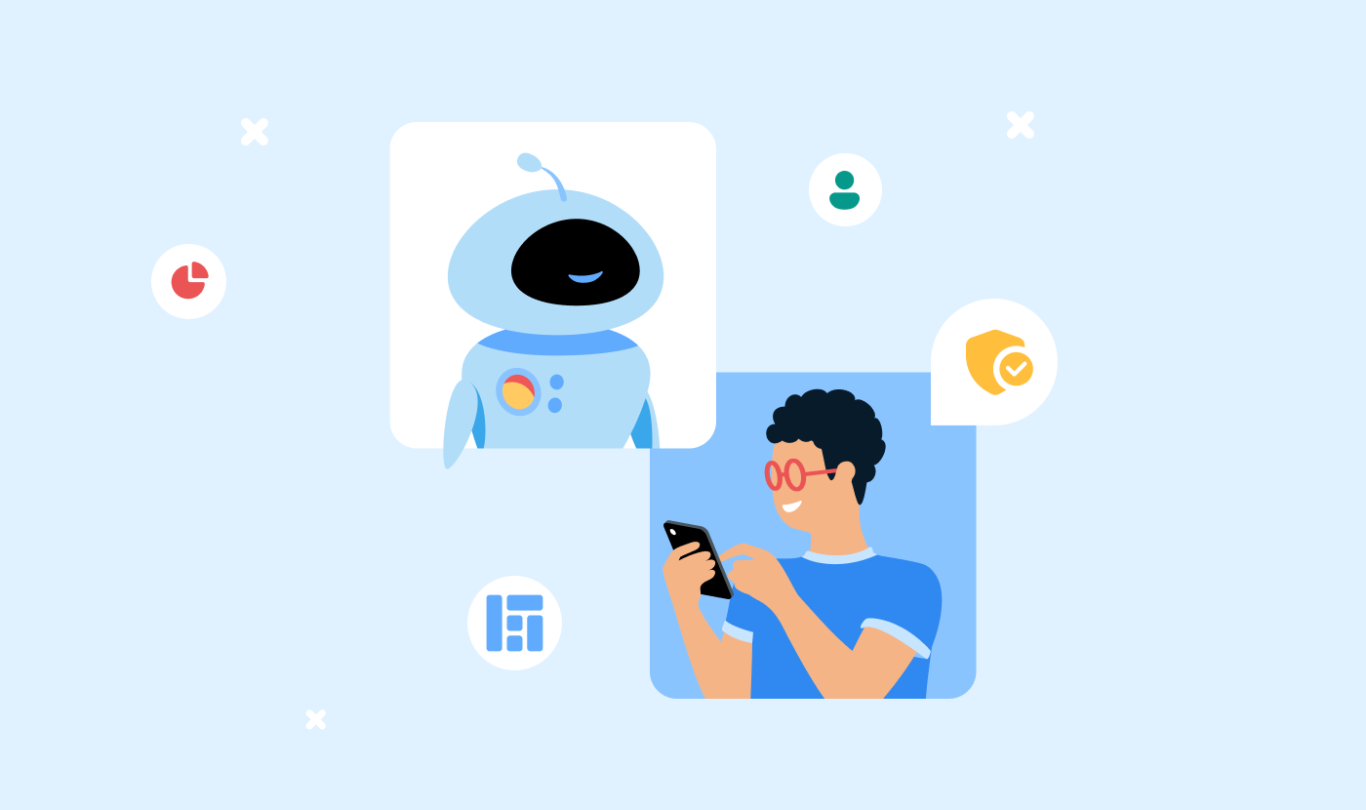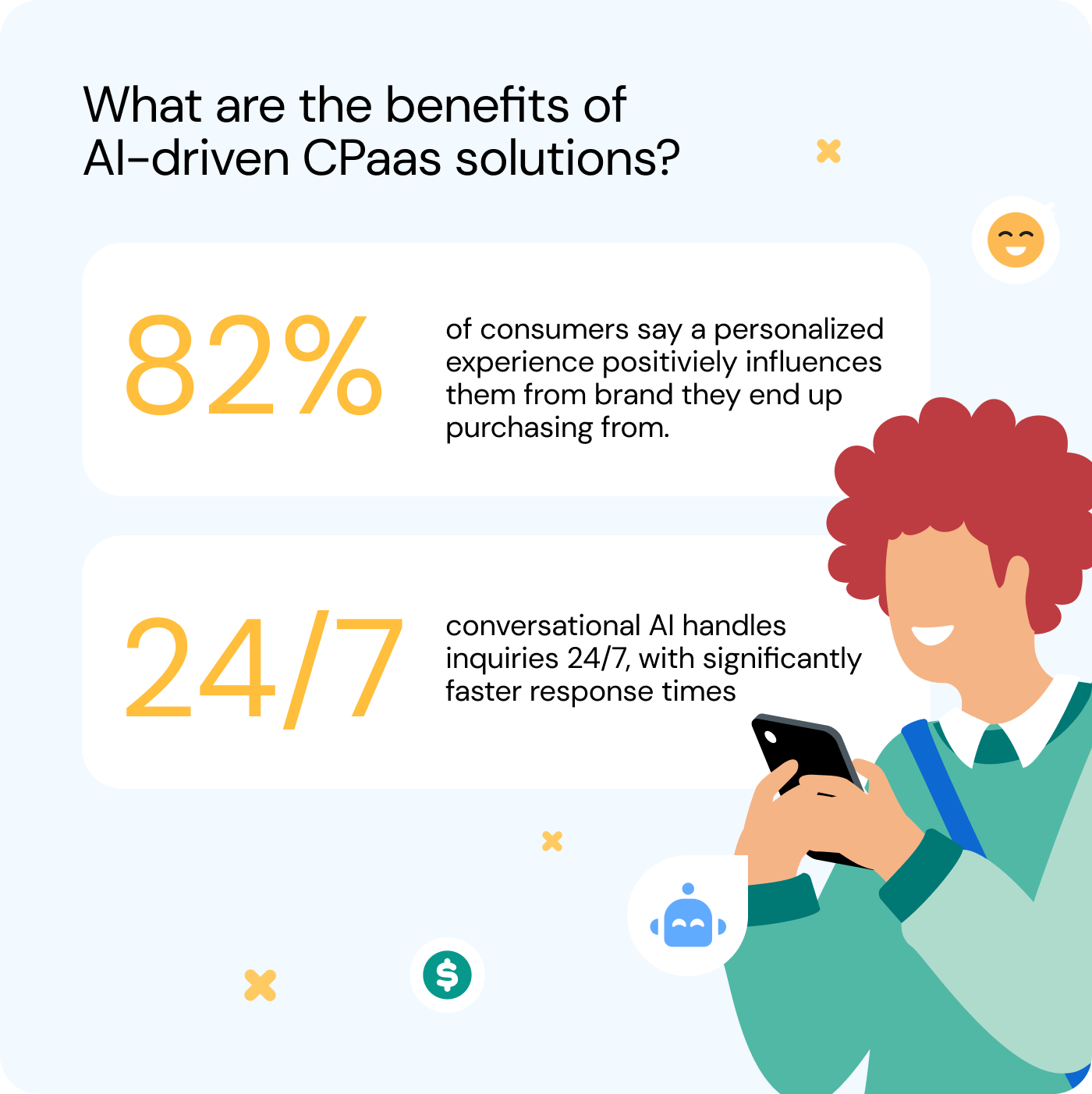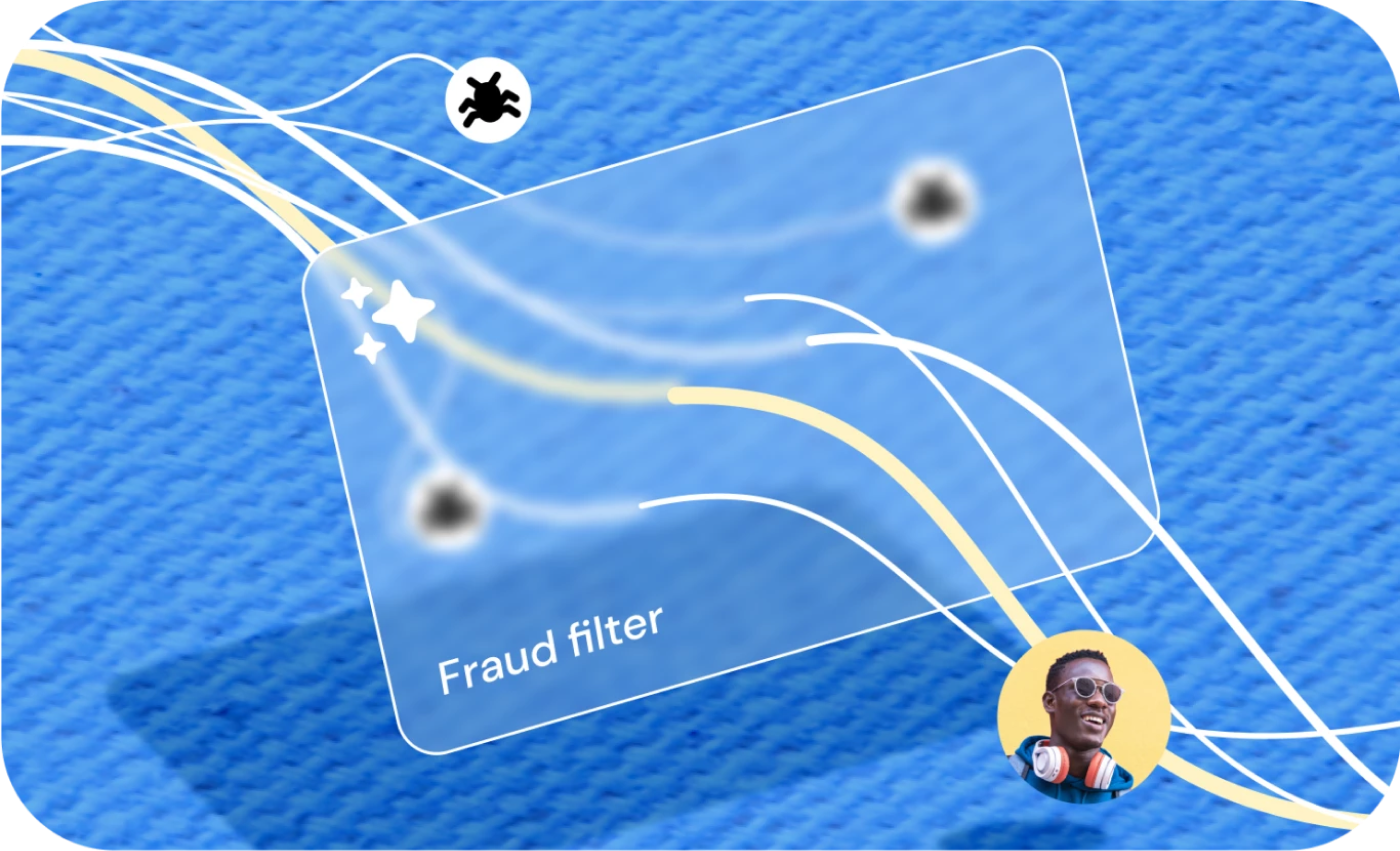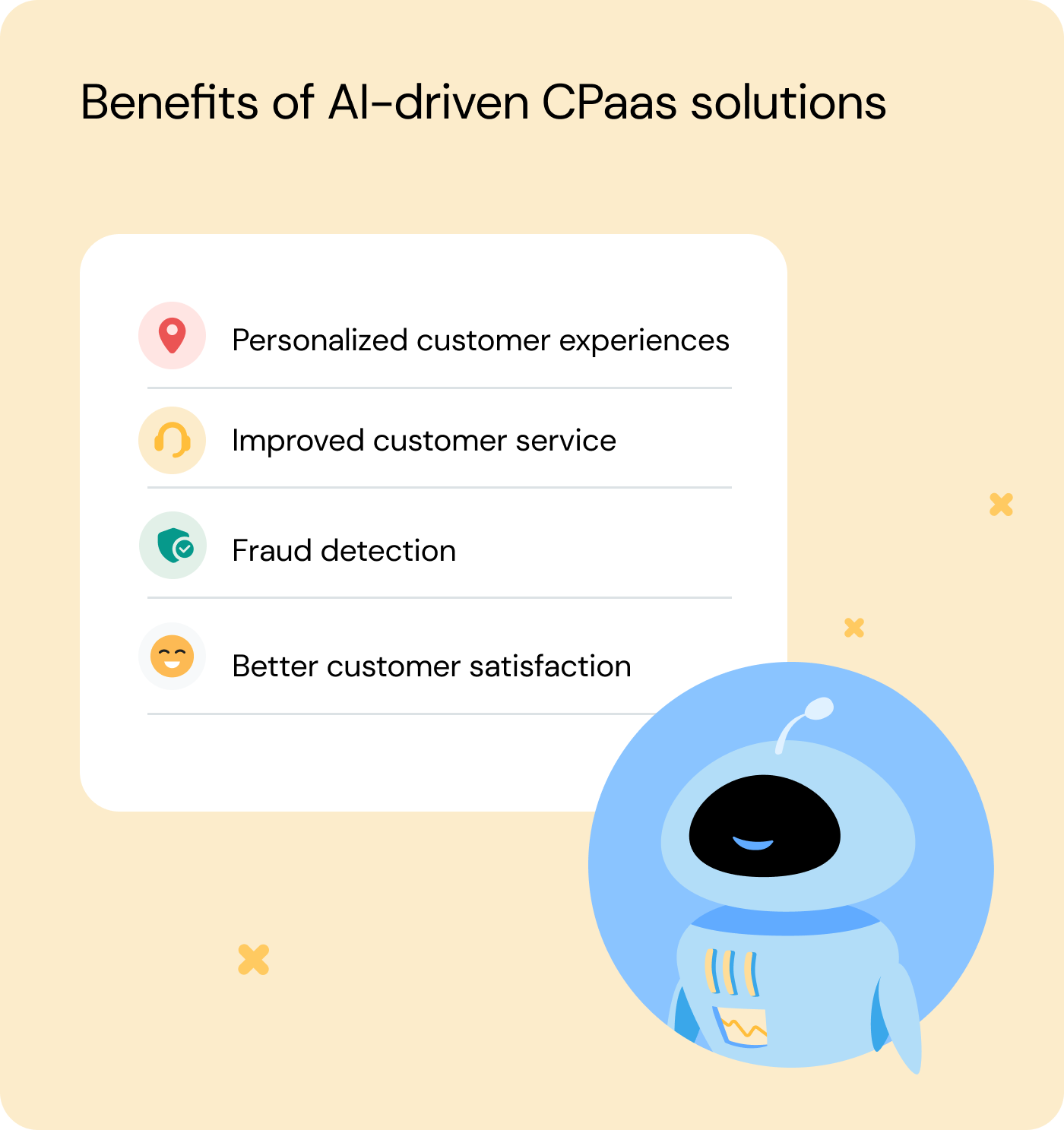Insights
Smart talk: How AI and CPaaS are changing the conversation

It’s like a match made in engagement (and acronym) heaven. Communications Platforms as a Service (CPaaS) and AI complement one another in ways that bring a wide range of benefits to organizations of all shapes and sizes and their customers.
From hyper-personalization and juiced up customer services to laser-focused fraud detection and engagement stats that make even the most cynical customer experience manager blush, the marriage of AI and CPaaS has been long in the making.
Let’s take a look at the current state of AI in CPaaS, dive into the spectrum of features that they deliver together, discuss some potential pitfalls, and roll out the crystal ball to predict just how far this revolutionary merging will fly in the future.

CPaaS has a brain: Status of AI in communication tech
First, it must be said that CPaaS – a cloud-based framework that boosts customer communications, creating fertile grounds for contextual conversations – and AI have worked together for quite some time. Once it became clear that CPaaS tools could help enterprises automate parts of the customer journey, AI and CPaaS started collaborating through customer service chatbots trained on Natural Language Processing (NLP) that could handle basic queries.
But with the introduction of Natural Language Understanding (NLU), AI’s ability to understand intents and sentiments in human texts took chatbots to the next level, making them more sophisticated and effective.
And now we’re at the generative AI (GenAI) stage based on large language models (LLMs), which use huge amounts of data to train up AI and have an amazing capacity to generate texts, images, and videos. The Boston Consulting Group estimates that by 2025, GenAI will have a 30% share of the total AI market and be worth $60 billion, which is why we’ve seen content creation, formatting, and personalization take off with versions like ChatGPT, for example.
This has all made integrating AI capabilities into APIs – the lifeblood of CPaaS solutions – hassle-free, helping businesses adopt and benefit from the tech seamlessly.
Here’s some examples of AI-based CPaaS traits at work:
Hyper-personalization/individualization: Using AI to predict customer needs and curate content tailored to individual preferences is a game-changer. With all that data at their disposal, brands can really boost interactions on preferred channels, creating a seamless experience that feels personal.
Contextual engagement: Retrieval-augmented generation (RAG) bots deliver timely and relevant responses, ensuring first contact resolution and swift service delivery. This contextual engagement means customers receive the help they need exactly when they need it.
Real-time insights: AI-integrated CPaaS platforms provide powerful analytics capabilities, including sentiment analysis and actionable recommendations. These real-time insights help businesses to adapt and respond to customer needs quickly.
Summarize with GenAI: GenAI can distill long-form chats, emails, and reports down to their core, transforming that wordy information into bite-sized, easy-to-understand morsels, without the need to store content in structured databases.
Channel orchestration: AI helps create a 360-degree view of customer conversations, ensuring consistency across all channels and touchpoints. This arrangement boosts the overall customer experience (CX) by keeping continuity and context throughout.
Adoption statistics: The integration of AI and CPaaS is definitely on the rise. Current adoption rates are impressive, and future predictions suggest even greater integration as businesses recognize the value of these technologies working together.

What are the benefits of AI-driven CPaas solutions?
Close your eyes and imagine a world where every customer interaction feels uniquely tailored to you, where inquiries are handled quickly around the clock, and where the risk of fraud is lessened while CX is boosted.
Open your eyes. That world exists now. These innovative systems are revolutionizing customer experiences, making them more personalized, efficient, and secure. Let’s review some of the benefits they bring to the table:
Personalized customer experiences
According to a 2023 Medallia market research survey, 82% of consumers say a personalized experience positively influences them from brand they end up purchasing from. Tailoring interactions to match customer preferences and needs enhances satisfaction and loyalty. AI-driven personalization ensures every interaction feels unique and valued, and it can do so efficiently using vast amounts of data.
Improved customer service
Conversational AI handles inquiries 24/7, with significantly faster response times, freeing human agents to tackle more complex issues. In the old days, bots would transfer rather than resolve issues. But the big shift now is that RAG bots can get to resolutions at a fraction of the time it takes for a human. This improves efficiency and ensures customers always receive timely assistance. And lest we forget, automating routine tasks directly reduces operational costs. Businesses can use resources more effectively, driving efficiency and the good old bottom line.
Fraud detection
One of the cool things about predictive AI is its ability to detect unusual patterns in data. By analyzing both historical and real-time traffic, GenAI can pick up on even the slightest anomalies, which is crucial for early fraud detection. Plus, it can tell the difference between real user activities and fraudulent ones, which helps reduce false alarms and keeps things running smoothly for genuine users.
Better customer satisfaction
Intelligent, timely answers to questions ensure top-notch customer experiences. AI-driven CPaaS solutions can adapt to customer needs, providing the support and information they require.
Predictions and potential pitfalls
We’ve looked at where we are with CPaaS tools infused with AI and how we got there. Now let’s take a leap into the future to see where AI and CPaaS will most likely go, while also taking an honest look at some of the issues surrounding the merging of the two.
Industry-specific customization
Customizing AI models for specific industries will unlock their full potential. Tailored solutions will address unique challenges and opportunities within different sectors. Think of healthcare, for example. Remote patient monitoring will get a real upgrade with AI-infused CPaaS solutions, processing large amounts of real-time data quickly, which is huge for early prevention, intervention, continuity of care, clinical operations, and much more.
Constant evolution
Improved analytics, enhanced user interfaces, and more intuitive AI interactions are areas ripe for innovation. For instance, right now GenAI can’t think like a human. Reasoning isn’t built into tools like Chat-GPT, but soon we will be able to create a type of reasoning with prompts intended to help these models think better.

Potential challenges
As CPaaS continues to merge with AI, there are a few bumps in the road we need to watch out for.
Data privacy
Customers want their data kept safe and sound, but some popular AI tech likes to sneakily collect and use personal info without permission. Right now, AI is like the wild west—mostly unregulated and full of privacy concerns. But don’t worry, more regulations are on the horizon to keep things in check.
Automation over-reliance
While AI can handle a lot, it doesn’t have the human touch that’s sometimes needed for tricky situations. This is where human oversight becomes crucial—we need people to keep an eye on things and step in when AI might miss the mark.
F.U.D
There are still those that harbor a lot of fear, uncertainty and doubt about AI going too far. Sometimes it’s justified, as we saw recently with a large chat platform company not making it easy for users to opt out so they could use customer data to train their AI. Transparent guardrails are a must for providers considering AI implementation, particularly as it becomes more widespread.
What we’re doing
At Sinch, we apply AI across an array of communications tech. But we don’t do it willy-nilly. We call it “Intentional Intelligence”, where we prioritize use cases that have the potential for real impact. And we ensure that guardrails are baked in from the beginning and monitored all the time.
The transformative impact of AI on the CPaaS industry is undeniable. Sinch is at the forefront of this revolution, working with AI to solve meaningful problems and enhance customer experiences. Get in touch with us today to see how we can help you get a leg up on the competition with our industry-leading, AI-based CPaaS solutions.



